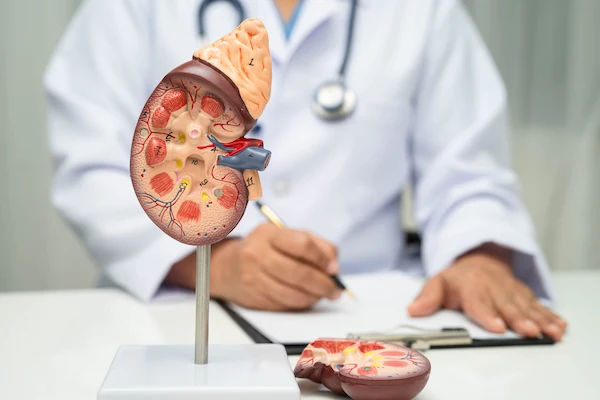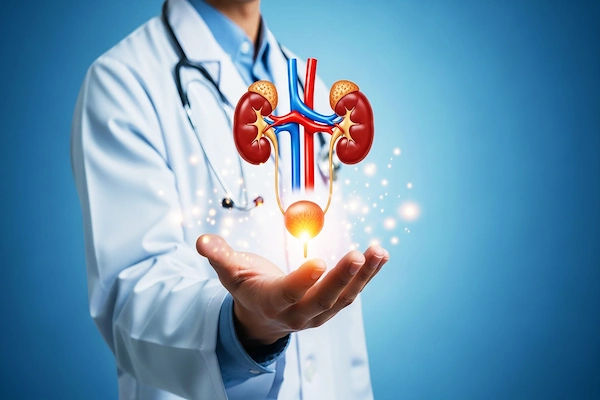Kidney Health: The Importance of Monitoring Creatinine
Learn why monitoring creatinine levels is essential for kidney health. Understand its significance, normal ranges, and tips for maintaining healthy kidney function.

Written by Dr. Shaik Abdul Kalam
Reviewed by Dr. J T Hema Pratima MBBS, Fellowship in Diabetes Mellitus
Last updated on 13th Jan, 2026

Introduction
Your kidneys are the unsung heroes of your body, working tirelessly around the clock to filter waste, balance fluids, and regulate blood pressure. But how do you know if these vital organs are functioning properly? The answer often lies in a simple blood test and one key marker: creatinine. Monitoring your creatinine level is one of the most effective ways to monitor your kidney health and catch potential issues early. This guide will empower you with everything you need to know about creatinine, from what it is and why it matters to how you can keep your levels in a healthy range. Whether you're managing a chronic condition or simply being proactive about your health, understanding this crucial metric is a fundamental step toward long-term wellness.
Understanding Your Kidneys: The Body's Master Filters
Your two kidneys, each about the size of a fist, are sophisticated processing plants. Every day, they filter about 120-150 quarts of blood to produce about 1-2 quarts of urine, composed of wastes and extra fluid. This process is essential for removing toxins, balancing electrolytes, and releasing hormones that regulate blood pressure and produce red blood cells.
What Do Healthy Kidneys Do?
Healthy kidneys perform a symphony of critical functions:
Waste Removal: Filtering out urea and creatinine from the blood.
Fluid Balance: Regulating the amount of water and salts in your body.
Blood Pressure Control: Releasing the enzyme renin which helps manage blood pressure.
Red Blood Cell Production: Producing erythropoietin, a hormone that stimulates bone marrow to make red blood cells.
Bone Health: Converting vitamin D into its active form, which is essential for calcium absorption.
How Kidney Function Declines
Kidney damage often occurs slowly and silently over many years. It typically begins with the gradual loss of the kidney's filtering units, called nephrons. As nephrons are damaged, the remaining healthy ones must work harder to compensate. This is why you may not feel any symptoms of high creatinine or kidney disease until significant, sometimes irreversible, damage has already occurred. This makes proactive monitoring not just wise, but essential.
Consult a Nephrologist for the best advice
Creatinine Decoded: The Key Marker of Kidney Health
Creatinine is a vital indicator of kidney health.
What is Creatinine? A Waste Product Explained
Creatinine is a chemical waste product generated from the normal wear and tear of muscles. It is produced at a relatively constant rate, which is influenced by your muscle mass. Everyone has creatinine in their bloodstream, and its level is a direct reflection of how well your kidneys are performing their filtration job.
How Your Kidneys Process Creatinine
Once produced, creatinine is released into the bloodstream. The kidneys' job is to filter it out and excrete it through urine. If the kidneys are not functioning optimally, their ability to clear creatinine from the blood diminishes. This leads to a buildup of creatinine in the blood, which is a primary indicator of reduced kidney function.
What is a Normal Creatinine Level?
A "normal" level can vary, but generally falls within these ranges. It's crucial to interpret your results with a doctor, as many factors influence them.
Normal Range for Men
For adult men, a normal serum creatinine level is typically between 0.74 to 1.35 mg/dL (milligrams per decilitre). Men generally have higher levels due to greater muscle mass.
Normal Range for Women
For adult women, a normal range is usually between 0.59 to 1.04 mg/dL.
Factors That Influence Your Levels
Age: Levels can decrease with age as muscle mass declines.
Muscle Mass: Athletes or very muscular individuals may have higher baseline creatinine levels without it indicating kidney disease.
Diet: A very high-protein diet can temporarily increase creatinine levels.
Pregnancy: Levels often decrease during pregnancy.
The Silent Alarm: Symptoms of High Creatinine & Kidney Disease
Kidney disease is often called a "silent" disease because early signs can be subtle or non-existent. As function declines, symptoms become more apparent.
Early Signs You Might Miss
Changes in urination frequency (especially at night)
Foamy or bubbly urine (indicating protein)
Mild swelling in feet, ankles, or around the eyes
Fatigue and general lack of energy
Advanced Symptoms That Demand Attention
Persistent puffiness and severe swelling (oedema)
Nausea, vomiting, and loss of appetite
Shortness of breath
Metallic taste in the mouth or ammonia breath
Confusion or difficulty concentrating
Severe itching
If you experience a combination of these advanced symptoms, it is critical to consult a doctor immediately. You can connect with a specialist online through Apollo24|7 for a prompt consultation.
Beyond Creatinine: Other Important Kidney Function Tests
While creatinine is vital, doctors use a panel of tests for a complete picture.
Glomerular Filtration Rate (eGFR)
This is perhaps the best overall measure of kidney function. eGFR is a calculated value based on your creatinine level, age, sex, and body size. It estimates how many milliliters of blood your kidneys filter each minute. An eGFR below 60 for three months or more indicates chronic kidney disease.
Blood Urea Nitrogen (BUN)
Urea nitrogen is another waste product. The BUN test measures its amount in the blood. While useful, BUN can be influenced by factors like dehydration or a high-protein diet, so it's always viewed alongside creatinine.
Urine Albumin-to-Creatinine Ratio (UACR)
This test checks for albumin (a type of protein) in your urine. Healthy kidneys don't allow much protein to pass into urine. The presence of albumin is an early sign of kidney damage, often from diabetes or high blood pressure.
For a comprehensive assessment, your doctor may order these tests together. Apollo24|7 offers convenient home collection for these crucial kidney function tests, making it easier to stay on top of your health.
Get Your Health Assessed
Common Causes of Elevated Creatinine Levels
Understanding the causes is the first step toward prevention and management.
Underlying Medical Conditions
Diabetes: The leading cause of kidney disease (diabetic nephropathy).
High Blood Pressure (Hypertension): The second leading cause, as it damages the kidneys' delicate blood vessels.
Heart Disease: Can reduce blood flow to the kidneys.
Kidney Infections or Inflammation: Such as glomerulonephritis.
Lifestyle and Dietary Factors
Chronic dehydration
A diet excessively high in protein or red meat
High intake of sodium (salt)
Smoking, which damages blood vessels
Medications That Can Affect Kidneys
Certain over-the-counter and prescription drugs, like NSAIDs (e.g., ibuprofen, naproxen), some antibiotics, and contrast dyes used in imaging scans, can be hard on the kidneys, especially with long-term use.
How to Lower Creatinine Levels and Support Kidney Health
Maintaining kidney health starts with managing key markers. Support your kidney health through dietary changes, staying hydrated, and lifestyle modifications.
(Note: Always consult a doctor or a registered dietitian before making significant dietary changes, especially if you have known kidney issues.)
Dietary Changes for Healthy Kidneys
Adopting a kidney healthy diet plan is a cornerstone of management.
Foods to Embrace
Fibre-Rich Foods: Fruits, vegetables, and whole grains (within potassium limits if advised).
Lean Proteins: In moderation (e.g., fish, skinless chicken, plant-based proteins like beans and lentils, unless on a restrictive diet).
Healthy Fats: From sources like olive oil and avocados.
Foods to Limit or Avoid
High-Sodium Foods: Processed foods, canned soups, chips, and pickles.
High-Potassium Foods: Bananas, oranges, potatoes, tomatoes (if levels are high).
High-Phosphorus Foods: Dairy products, nuts, beans, dark sodas.
Red Meat: Can increase creatinine production.
The Importance of Staying Hydrated (The Right Way)
Dehydration can spike creatinine levels. Drinking adequate water helps the kidneys clear waste more effectively. However, if you have advanced kidney disease, your doctor may recommend fluid restriction. The right balance is key.
Lifestyle Modifications: Exercise and Stress Management
Regular, moderate exercise helps control blood pressure and blood sugar, two major kidney risk factors. Avoid excessive, intense workouts that can temporarily raise creatinine. Managing stress through meditation, yoga, or hobbies also supports overall cardiovascular and renal health.
When to Seek Help: Consulting a Healthcare Professional
You should definitely talk to a doctor if:
Your routine blood test shows consistently high creatinine levels.
You are experiencing any of the symptoms mentioned above.
You have risk factors like diabetes, high blood pressure, or a family history of kidney disease.
You are planning to start a new supplement or medication.
Early intervention is the most effective strategy to preserve kidney function. If your blood work is concerning or symptoms persist, consult a nephrologist online with Apollo24|7 for further evaluation and a personalised management plan.
Conclusion: Taking Proactive Control of Your Kidney Health
Monitoring your creatinine level is not about fostering fear; it's about empowering yourself with knowledge. Your kidneys are resilient organs, and by understanding how to support them, you can take significant strides toward preventing disease and maintaining overall vitality. Remember, small, consistent actions like staying hydrated, eating a balanced diet, managing underlying conditions, and getting regular check-ups compound into powerful long-term health benefits. Don't wait for symptoms to appear. Be proactive, get tested, and make your kidney health a priority today. Your future self will thank you for it.
Consult a Nephrologist for the best advice
Consult a Nephrologist for the best advice
Dr Ch Sashidhar
Nephrologist
20 Years • MBBS, MD General Medicine, DNB, Nephrology
Secunderabad
Apollo Hospitals Secunderabad, Secunderabad

Dr. Pardha Saradhi
Nephrologist
9 Years • MBBS, MD-DNB (Gen. Med.), DNB (Nephro)
Hyderabad
Apollo Hospitals D R D O kanchanbagh, Hyderabad
(75+ Patients)

Dr. Manju Kamal
Nephrologist
12 Years • MBBS,MD(General Medicine), DNB,DM(Nephrology)
Angamaly
Apollo Hospitals Karukutty, Angamaly

Dr. S Rajagopalan
Nephrologist
26 Years • MD (Gen. Med.), DNB (Nephro)
Chennai
Apollo Hospitals Greams Road, Chennai
(200+ Patients)

Dr. Venkatesh Rajkumar S
Nephrologist
10 Years • MD (Gen Med.), DM (Nephro), FISNC (Interventions)
Chennai
Apollo Hospitals Greams Road, Chennai
(275+ Patients)
More articles from Kidney Disease
Frequently Asked Questions
1. What is a dangerously high level of creatinine?
A level above 1.3 mg/dL for women and 1.4 mg/dL for men may indicate potential kidney issues. Levels above 5.0 mg/dL are considered severe and often point to significant kidney impairment, potentially requiring dialysis. However, context is everything; always consult a doctor for interpretation.
2. Can drinking water lower my creatinine?
Yes, if you are mildly dehydrated, drinking water can help normalize your levels by improving kidney filtration. However, if you have chronic kidney disease, excessive water won't help and could be harmful. Hydration helps, but it's not a cure for underlying kidney problems.
3. What are the best foods to eat to lower creatinine?
Focus on high-fibre plant foods like leafy greens, berries, and cauliflower (mindful of potassium). Incorporate lean proteins like fish and limit red meat, sodium, and processed foods. A dietitian can create the best kidney healthy diet plan for your specific needs.
4. How often should I get my creatinine levels checked?
If you have no risk factors, a check-up during your annual physical is sufficient. If you have diabetes, hypertension, or a family history, your doctor may recommend testing every 6-12 months, or more frequently if you have existing kidney disease.
5. Is high creatinine always a sign of kidney disease?
Not always. Temporarily high levels can be caused by dehydration, a high-protein meal, intense exercise, or certain medications. This is why doctors look for persistent elevation over time and use other tests like eGFR for a definitive diagnosis.

_5.webp)

_7.webp)

